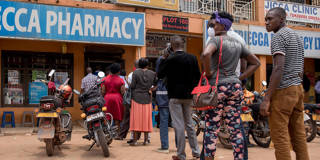The COVID-19 pandemic is likely to impose heavy human, financial, economic, and social costs on Africa. But the crisis also creates an opportunity to re-examine the continent’s fiscal and economic-policy priorities, build stronger health and social sectors, and establish a global fund to support productive investment.
WASHINGTON, DC – The coronavirus pandemic could not have come at a worse time for Africa. Despite improved macroeconomic management over the last decade, the continent still lacks the resources to tackle high levels of poverty and inequality, create formal-sector jobs, and foster the structural transformations needed to absorb 12 million young people into the labor market every year. And now COVID-19 threatens to break Africa’s back economically.
Africa’s low average annual growth of 3.3% in 2014-19 was mainly the result of erroneous development strategies that focused on unviable capital-intensive industries (often in commodity sectors), instead of promoting competitive labor-intensive sectors. Insufficient growth has in turn constrained public finances, leading to underfunded health systems, weak governance, rapid increases in public debt, and large infrastructure deficits.
Given Africa’s precarious health institutions, and its shortage of doctors, health workers, medicine, and medical supplies, COVID-19 infections are likely to soar, sparking a humanitarian crisis that most likely will go unreported. The virus could spread widely in poorer areas with no water or sewage hook-ups, and in communities where low education levels, prevailing social habits, and skepticism toward government complicate containment efforts. If a cure for COVID-19 is not made widely available soon, the pandemic could devastate Africa.

WASHINGTON, DC – The coronavirus pandemic could not have come at a worse time for Africa. Despite improved macroeconomic management over the last decade, the continent still lacks the resources to tackle high levels of poverty and inequality, create formal-sector jobs, and foster the structural transformations needed to absorb 12 million young people into the labor market every year. And now COVID-19 threatens to break Africa’s back economically.
Africa’s low average annual growth of 3.3% in 2014-19 was mainly the result of erroneous development strategies that focused on unviable capital-intensive industries (often in commodity sectors), instead of promoting competitive labor-intensive sectors. Insufficient growth has in turn constrained public finances, leading to underfunded health systems, weak governance, rapid increases in public debt, and large infrastructure deficits.
Given Africa’s precarious health institutions, and its shortage of doctors, health workers, medicine, and medical supplies, COVID-19 infections are likely to soar, sparking a humanitarian crisis that most likely will go unreported. The virus could spread widely in poorer areas with no water or sewage hook-ups, and in communities where low education levels, prevailing social habits, and skepticism toward government complicate containment efforts. If a cure for COVID-19 is not made widely available soon, the pandemic could devastate Africa.